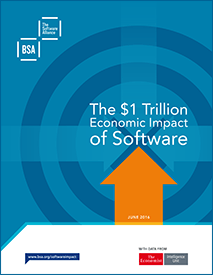 Today, I’ll be at New America talking about the impact software has on the economy. Software is at the forefront of American innovation — laying the groundwork for advances that promise to make businesses more efficient, jobs more plentiful, opportunities more pervasive, and the economy even more prosperous.
Today, I’ll be at New America talking about the impact software has on the economy. Software is at the forefront of American innovation — laying the groundwork for advances that promise to make businesses more efficient, jobs more plentiful, opportunities more pervasive, and the economy even more prosperous.
BSA | The Software Alliance has released “The $1 Trillion Economic Impact of Software,” a first-of-its-kind study conducted by researchers at The Economist Intelligence Unit (EIU) to quantify software’s impact on the US economy.
Here are a few key findings:
- Software supports nearly 10 million jobs nationwide.
- Software drives economic gains in all 50 states.
- The average annual wage for a software developer is $108,760. That salary, along with big career prospects and satisfying work is why Glassdoor named “data scientist” as the best job for 2016 and CNN named “software architect” as the number one job for 2015.
Software jobs are interesting high paying jobs — but we need more engineers and coders.
Our industry has more jobs than we can fill. The Department of Labor projects that by 2020, US universities will only be able to fill less than one-third of 1.4 million computer specialist job openings. We need to encourage more young people to pursue science careers, including computer science.
I will be discussing the study’s findings, as well as the need to expand the pipeline of software talent, at a New America event today called “Software’s Economic Impact + The Drive for Talent.” I will be joined by Ryan Burke, Senior Policy Advisor, National Economic Council, The White House; Mark Doms, PhD, Former Undersecretary for Economic Affairs, Department of Commerce; Lisa Guernsey, Director of New America’s Learning Technologies Project; Melissa Moritz, Deputy Director of STEM, Department of Education; and Cameron Wilson, COO and VP, Government Relations, Code.org.
The full study, along with detailed summaries of the findings, is available at www.bsa.org/softwareimpact.
Tags: data economy software US

Victoria Espinel is a global leader advancing the future of technology innovation.
As CEO of BSA | The Software Alliance, Victoria has grown the organization’s worldwide presence in over 30 countries, distinguishing BSA as the leader for enterprise software companies on issues including artificial intelligence, privacy, cybersecurity, and digital trade. She launched the Digital Transformation Network and the Global Data Alliance, flagship BSA initiatives to further BSA’s collaboration with 15+ industry sectors globally. Victoria founded Software.org, the enterprise software industry’s nonprofit partner that educates policymakers and the public about the impact of software and careers within the industry.
Victoria serves on President Biden’s National Artificial Intelligence Advisory Committee (Chair of the International Working Group), served as a member of the President’s USTR Advisory Committee for Trade Policy and Negotiations (ACTPN), and chaired the Future of Software and Society Group at the World Economic Forum. She is a lifetime member of the Council on Foreign Relations.
Victoria has testified on multiple occasions before the US Congress, European Parliament, and Japanese Diet. Victoria speaks frequently to groups about AI, cybersecurity, and STEM education, including Latinas in Tech, Girls Rule the Law, the Congressional Staff Hispanic Association, Women’s Congressional Staff Associations, Girls Who Code, EqualAI, CSIS, and numerous academic institutions. She has been featured in a wide range of media outlets, including New York Times, Washington Post, Financial Times, Forbes, C-SPAN, BBC, Bloomberg Business, The New Yorker, and NPR.
Prior to BSA, Victoria was confirmed by the US Senate to serve as the first White House “IP Czar,” establishing a new office in the White House and advising President Obama on intellectual property. She also served in the Bush Administration as the first chief US trade negotiator for intellectual property and innovation, a role in which she created the office of Intellectual Property and Innovation at USTR and led negotiations with over 70 countries.
Victoria launched Girls Who Code’s Washington, DC summer program and serves on the Board of Directors for ChIPs, a nonprofit organization advancing women in technology law and policy.
She holds an LLM from the London School of Economics, a JD from Georgetown University Law School, and a BS in Foreign Service from Georgetown University’s School of Foreign Service. She is a native of Washington, DC, and the proud proprietor of Jewel of the South, a restaurant in New Orleans.
View all posts by Victoria Espinel >>
 Today, I’ll be at New America talking about the impact software has on the economy. Software is at the forefront of American innovation — laying the groundwork for advances that promise to make businesses more efficient, jobs more plentiful, opportunities more pervasive, and the economy even more prosperous.
Today, I’ll be at New America talking about the impact software has on the economy. Software is at the forefront of American innovation — laying the groundwork for advances that promise to make businesses more efficient, jobs more plentiful, opportunities more pervasive, and the economy even more prosperous.
